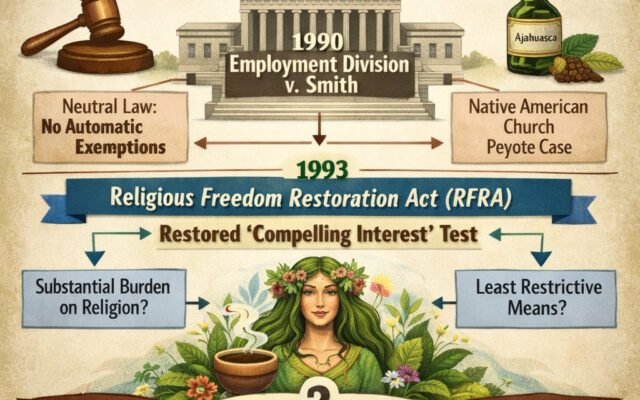On July 3, 2025, the U.S. Supreme Court agreed to review Olivier v. City of Brandon, a case that could reshape how and when individuals convicted under local laws can seek prospective relief in federal court. The case centers on Gabriel Olivier, a Christian preacher who was fined in 2021 for violating a Mississippi city ordinance that restricts demonstrations near a public amphitheater.
Olivier pleaded no contest to the charge and paid a $304 fine. He later filed a federal lawsuit under 42 U.S.C. § 1983 seeking only prospective injunctive relief to prevent the ordinance’s future enforcement, arguing it violates his First and Fourteenth Amendment rights. The Fifth Circuit rejected his claim, citing the Supreme Court’s 1994 decision in Heck v. Humphrey, which bars civil rights suits that would imply the invalidity of a prior conviction.
In its ruling, the Fifth Circuit extended Heck to block forward-looking equitable relief, applying its own precedent in Clarke v. Stalder. Olivier’s legal team argues this reading goes far beyond the scope of Heck, which addressed only retrospective damages claims. They point out that Olivier does not challenge the past conviction or seek money damages but merely wants assurance that the ordinance won’t be used to restrict his future speech.
The petition for certiorari, filed on March 14, 2025, was submitted by attorneys at Gibson, Dunn & Crutcher LLP, alongside counsel from First Liberty Institute. The Supreme Court’s decision to grant review follows an en banc Fifth Circuit vote in which eight judges dissented, criticizing the panel decision as inconsistent with Supreme Court precedent and in direct conflict with decisions from the Ninth and Tenth Circuits.
In those jurisdictions, courts have allowed plaintiffs to seek prospective relief under § 1983 even after being convicted under the law in question. The Ninth Circuit, in Martin v. City of Boise, and the Tenth Circuit, in Lawrence v. McCall, both concluded that forward-looking injunctions do not necessarily undermine the validity of prior convictions and thus fall outside the Heck bar.
Olivier’s attorneys also argue that barring such suits where no habeas relief was ever available — as in Olivier’s case, since he was never in custody — effectively eliminates any path for redress. That question, too, is part of the Supreme Court’s review, and parallels another pending case, Wilson v. Midland County, which raises similar issues.
Legal observers expect the Court’s ruling could clarify whether Heck applies to future-oriented relief and whether § 1983 remains available to plaintiffs who were never eligible for habeas petitions. Oral arguments are expected in the 2025–26 term, with a decision likely by June 2026.
Why the Olivier Case Matters for Religious Liberty
At its core, the Olivier case is about whether the government can punish someone for sharing their religious beliefs in public — and then permanently block them from going to court to prevent it from happening again.
Gabriel Olivier believes his Christian faith calls him to preach in public. But after he was fined by the City of Brandon, Mississippi, for doing so near a local amphitheater, he tried to protect himself from future punishment by asking a federal court to declare the law unconstitutional. The court refused to hear his case — not because it disagreed with him on the First Amendment, but because he had already been convicted once under the law.
That legal rule comes from a Supreme Court decision called Heck v. Humphrey, which says people can’t use civil lawsuits to undo past convictions. But Olivier isn’t trying to erase his conviction — he’s just trying to stop the government from punishing him again.
If the lower court’s decision stands, it could create a dangerous precedent: once the government convicts someone for religious expression, that person may never be allowed to challenge the law again in federal court. That’s especially troubling for people like Olivier who were fined, not jailed, and thus can’t use the usual process (called habeas corpus) to challenge the conviction.
In plain terms, it means cities and states could enforce unconstitutional laws against religious speech, secure a conviction, and then shield those laws from future challenge by anyone already punished under them.
This case gives the Supreme Court a chance to say that the First Amendment still protects people who preach in public — and that those protections don’t disappear just because a city fined them once. Religious liberty includes not just the right to speak, but the right to ask a court to stop the government from silencing you again.
Holding: The Supreme Court will hear whether a street preacher can challenge a city ordinance regulating demonstrations near a public amphitheater despite having been convicted under it, testing the limits of the Heck v. Humphrey doctrine.
Holding: A rule stating that if a lawsuit would mean a past conviction was wrong, the person must get that conviction overturned first before proceeding with a civil rights claim.
Holding: Extended Heck to block forward-looking equitable relief in § 1983 cases.
Holding: Courts may allow plaintiffs to seek prospective relief under § 1983 even after conviction under the law in question.
Holding: Plaintiffs may seek prospective relief under § 1983 even after being convicted under the law in question.
